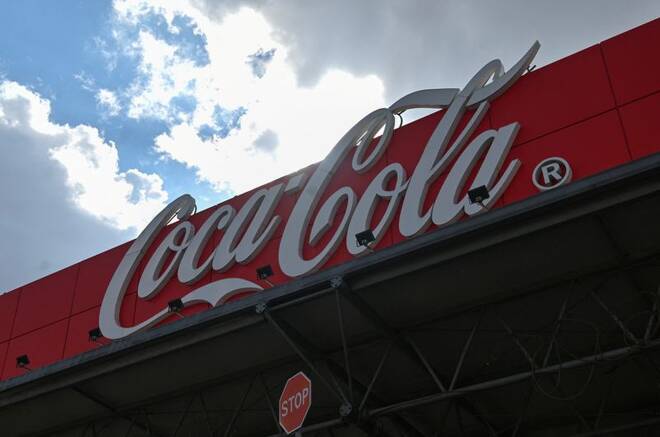Advertisement
Advertisement
Coca-Cola bottler to detail costs of exiting Russia
By:
By Jessica DiNapoli NEW YORK (Reuters) - Coca-Cola Co's bottler Coca Cola HBC AG will on Thursday detail the cost of stopping production and sales of Coke in Russia, a goal that has taken five months to reach as the company used up its existing supplies.
By Jessica DiNapoli
NEW YORK (Reuters) – Coca-Cola Co’s bottler Coca Cola HBC AG will on Thursday detail the cost of stopping production and sales of Coke in Russia, a goal that has taken five months to reach as the company used up its existing supplies.
Atlanta-based Coca-Cola Co, which relied on Coca Cola HBC to manufacture and distribute its sodas in Russia, said in March it would suspend production in the country. The Swiss-based bottler, in which Coca-Cola has a 20% stake, has since then been using up its remaining stock. It placed its last orders for concentrate in March.
Coca-Cola HBC last week in a statement on its website said it had stopped making and selling Coke-branded products in Russia and had no plans to re-introduce them. The bottler instead is re-naming its business in Russia Multon Partners and focusing on local brands including Dobry, Rich and Moya Semya.
The company’s full exit from Russia could be critical for legal battles Atlanta-based Coca-Cola is waging in Russia to protect its brand and stop third parties from importing its sodas from other countries and putting them on the shelves of Moscow supermarkets.
An attorney for Coca-Cola, Diana Shaklina of Moscow law firm Patentus, said in court in Russia in May that a judge should block shipments from importer Pivoindustria LLC because Coke was still in business in Russia, despite the company’s earlier statement that it had suspended operations.
Pivoindustria has already sold the sodas, and Coca-Cola is pursuing a judgment against the importer, the importer’s attorney Maxim Sosov said.
“No judicial protection shall be granted to the ‘I don’t use it myself and won’t give it to others’ behavior,” Sosov wrote in a June court filing in a related case.
There are signs that Moscow courts might be willing to consider a use-it-or-lose-it approach to trademarks and intellectual property.
The government in March adopted a decree allowing Russian businesses to use patents from countries deemed “unfriendly,” such as the United States and United Kingdom, without paying the owner of the intellectual property.
The case against Pivoindustria is still pending.
Coca-Cola separately won a judge’s approval to close the case to the public, after a Reuters reporter tried to attend.
Coca-Cola said in a statement that regardless of the suspension of its business in Russia, “the Coca-Cola Company takes the protection of its intellectual property rights seriously and protects its goodwill and reputation where third parties seek to trade off the company’s renowned, worldwide reputation.
“Our business in Russia remains suspended, and our actions support this decision,” Coca-Cola said. “The production of the Coca-Company brands in Russia has stopped, and we have not authorized any exports of The Coca-Cola Company brands into Russia.”
(Reporting by Jessica DiNapoli in New York and Reuters bureau; additional reporting by Amna Karimi in Bangalore; Editing by Vanessa O’Connell and Lisa Shumaker)
Related Articles
About the Author
Reuterscontributor
Reuters, the news and media division of Thomson Reuters, is the world’s largest international multimedia news provider reaching more than one billion people every day. Reuters provides trusted business, financial, national, and international news to professionals via Thomson Reuters desktops, the world's media organizations, and directly to consumers at Reuters.com and via Reuters TV. Learn more about Thomson Reuters products:
Did you find this article useful?
Latest news and analysis
Advertisement
